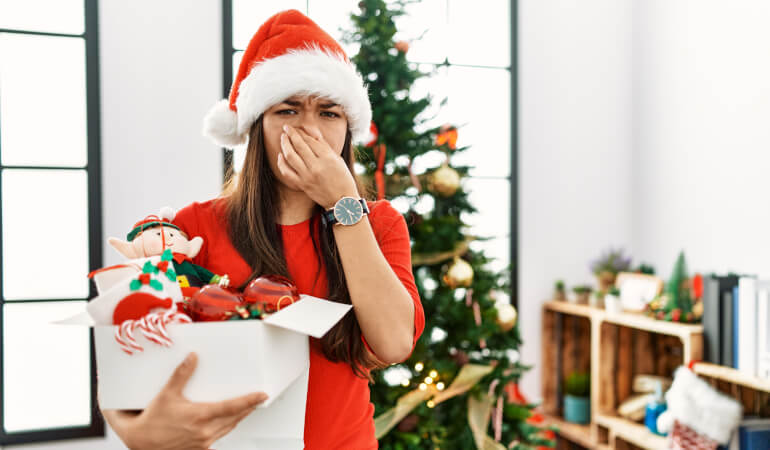
Have you ever walked into your living room expecting to be welcomed with the fresh, piney smell of your Christmas tree, only to be met with the odour of a wet dog when you don’t even own a pet? But why does a Christmas tree smell bad? You probably had no idea this could happen, but it absolutely can.
So in this guide, we’ll look at the most common causes of unpleasant smells, such as stagnant water and mould. You will also learn about viable remedies and how to deal with them.
Table of Contents
Should a Christmas tree smell?
Each type of Christmas tree brings its own unique scent. Depending on the species, a fresh tree can emit subtle or strong smells. Let’s look at things in depth.
Fir trees, known for their strong, woodsy aroma, are among the most fragrant. The Balsam fir, in particular, embodies the iconic “Christmas smell” with subtle hints of sweetness and spice that many people associate with the season.
Pine trees, on the other hand, provide a gentler fragrance. For example, the White Pine, which is fresh, slightly sweet, and earthy. Milder than Firs, pine trees bring a lighter forest aroma that fills the home with a natural and calming scent.
Then there are Spruce trees, like the Blue Spruce, which offer a sharp, almost citrus-like fragrance. Though not as potent as Fir trees, Spruce brings its own distinct, woodsy character.
And while these trees naturally emit pleasant scents, sometimes other less enjoyable odours can develop under certain circumstances.
- Musty smells. Often caused by stagnant water in the tree stand. A musty smell can develop if water isn’t absorbed properly or has been sitting for too long. This odour might remind you of dampness or mould;
- Sour odours. Sometimes, the base of the tree or its needles can emit a sour smell. This may be a sign that the tree is beginning to decompose. This can happen if the tree has been cut for a while before you brought it home;
- Chemical-like smells. Certain trees might have a slightly chemical-like scent, especially if sap has dried on the trunk. In some cases, this may also come from tree preservatives or treatments applied before sale.
What causes a Christmas tree to smell bad?
Several factors can contribute to this. They often stem from either environmental conditions or issues related to the tree’s health, as you will now see.
Environmental factors
The indoor environment plays a significant role in how your Christmas tree smells. For instance, high humidity levels in the home can lead to mould growth. Where there is mould, there is a musty smell, you know. Mould can develop on the tree itself or in the water reservoir if you leave stagnant water for too long.
In addition, central heating systems, common during the holiday season, tend to dry out the air, which can alter the way we perceive scents. As the air dries, the natural fragrance of the tree may become less pronounced, and if the tree is already past its prime, this can make any underlying odours more noticeable. Managing indoor conditions can help maintain a tree’s fresh scent and minimise unpleasant odours.
Health issues
The health of a Christmas tree and how it was handled before purchase matters a lot. Trees that were cut long before sale and left in storage can start to decay. As a result, bacteria start to flourish on the sap leaks and moisture, which can lead to foul odours. If a tree has a rotting base or has absorbed slimy water from a dirty reservoir, these can be major contributors to unpleasant smells.
Over time, the freshness of a Christmas tree naturally diminishes and that’s normal. It begins to dry out and the original aroma fades, being replaced by other odours. Aphids and other pests hiding in branches can cause a bad smell too. They leave a sticky residue and, when they die, create a musty smell as the tree dries.
How do you know if a tree is unhealthy?
If your Christmas tree smells musty, or even worse, rotten, you need to check for signs of potential problems.
- Check the tree’s water reservoir – Bad-smelling or slimy Christmas tree water means bacteria are growing. Stagnant water makes the tree area smell musty and can hurt the tree. Replace the water every few days and clean the reservoir.
- Examine the needles and branches – Healthy tree needles feel firm and pliable. If they fall off easily or look brittle, the tree may be losing moisture.
- Look at the trunk – Check the trunk base for slime or resin caps, which can block water intake and cause the tree to dry out and rot. A fresh, clean cut at the bottom can help the tree absorb water properly and maintain its scent.
How do you make a Christmas tree smell good?
Don’t worry. Here are a few ways to fix a smelly Christmas tree.
Refresh the water regularly
To keep your Christmas tree water from stinking, change the water every few days and rinse the reservoir to eliminate any accumulation. You may also add a tiny amount of white vinegar to help prevent bacteria development.
Trim and recut the trunk
Trim approximately half an inch from the base of your Christmas tree’s trunk to help it absorb water more effectively. This fresh cut creates new pores for water absorption, allowing the tree to stay hydrated and avoid drying out or losing its original perfume.
Use essential oils
Enhance the aroma of your tree with essential oils such as pine, fir, or cinnamon. Combine the oils and water in a spray bottle and softly sprinkle the branches. Avoid oversaturation, though, since heavy moisture might harm the decorations or needles. Stay clear of commercial air fresheners, since they frequently include chemicals that might dry out or harm the needles.
Place scented pine cones or fresh ornaments nearby
Layer seasonal scents by adding cinnamon-scented pine cones or clove-studded oranges around the tree’s base or in close decorations. These additives fill your home with holiday fragrances without having to treat the tree directly.
Tips for maintaining a healthy Christmas tree
Keeping your Christmas tree healthy throughout the holiday season requires some simple, consistent care.
- Choose a fresh tree – Begin by picking the freshest tree possible. Look for one with brilliant green needles that are securely connected and do not come off with a light shaking. Fresh needles and sticky sap at the trunk base indicate that a recently cut tree is ready to flourish inside.
- Make a clean, fresh cut – Before you put the tree in its stand, trim approximately a half-inch from the bottom of the trunk. This opens up new routes for water absorption, helping your tree to absorb moisture more efficiently. The new cut also keeps a sap “seal” from developing, which can obstruct water input.
- Keep the water reservoir full – A Christmas tree may take up to a quart of water every day, particularly in warm indoor environments. Check the water level on a regular basis, making sure it never goes below the base of the tree trunk. Use simple water—additives are unnecessary since they do not always increase hydration and can occasionally interfere with needle retention.
- Position the tree away from heat sources – To avoid drying out, keep the tree away from direct heat sources such as radiators, fireplaces, and heating vents. High temperatures might cause needles to dry and drop more quickly. Try to keep the room temperature reasonable and avoid direct sunlight if feasible.
- Maintain humidity – Indoor heating can dry up the air, affecting the freshness of your tree. To fight this, consider installing a humidifier in the room, which will keep both the tree and the needles moist. This additional moisture might help improve the tree’s smell.
- Avoid heavy decorations – Use lighter ornaments and spread them evenly to prevent branches from drooping.
- Check for signs of drying – Check your tree for dryness or needle loss. If needles turn colourless, feel brittle, or fall off excessively, add water or move the tree. Flexible needles mean a healthy, hydrated tree.
Take advantage of a Fantastic Christmas tree delivery service. Check availability and choose your delivery date.
Enter your postcode to view our rates and availability in your area.
For questions about the services we offer visit our main site
Takeaways
- If your Christmas tree smells bad, the source could be anything from stagnant water to mould or decay on the tree itself;
- Regularly change the water in the tree’s reservoir to prevent it from turning slimy and smelly due to bacterial growth;
- A Christmas tree may smell sour if it’s decomposing, which can happen if it was cut and stored too long before you purchased it;
- Central heating can dry out the air, reducing the tree’s scent and making any underlying odours more noticeable;
- Pests, like aphids, can also contribute to the odour.




This guide is so helpful! It’s great to know why a Christmas tree might smell bad and how to fix it. Love the tips on maintaining freshness—regular watering, trimming the trunk, and using essential oils are game changers!